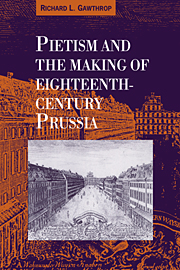Book contents
- Frontmatter
- Contents
- Preface
- Introduction
- 1 The German territorial state in the sixteenth and seventeenth centuries
- 2 Reformed confessionalism and the reign of the Great Elector
- 3 The nature of the pre-1713 Hohenzollern state
- 4 Lutheran confessionalism
- 5 Spenerian Pietism
- 6 From Spener to Francke
- 7 Halle Pietism I: ideology and indoctrination
- 8 Halle Pietism II: growth and crisis
- 9 Pietist–Hohenzollern collaboration
- 10 The impact of Pietist pedagogy on the Prussian army and bureaucracy
- 11 Civilian mobilization and economic development during the reign of Frederick William I
- Conclusion
- Bibliography
- Index
2 - Reformed confessionalism and the reign of the Great Elector
Published online by Cambridge University Press: 14 October 2009
- Frontmatter
- Contents
- Preface
- Introduction
- 1 The German territorial state in the sixteenth and seventeenth centuries
- 2 Reformed confessionalism and the reign of the Great Elector
- 3 The nature of the pre-1713 Hohenzollern state
- 4 Lutheran confessionalism
- 5 Spenerian Pietism
- 6 From Spener to Francke
- 7 Halle Pietism I: ideology and indoctrination
- 8 Halle Pietism II: growth and crisis
- 9 Pietist–Hohenzollern collaboration
- 10 The impact of Pietist pedagogy on the Prussian army and bureaucracy
- 11 Civilian mobilization and economic development during the reign of Frederick William I
- Conclusion
- Bibliography
- Index
Summary
The state-building accomplishments of the sixteenth-century Hohenzollern electors lagged behind those of their counterparts in most of the rest of the Empire. During the era before the Thirty Years’ War, none of the rulers of the Mark Brandenburg was able to counteract socioeconomic trends that in northeastern Germany and Poland worked against political centralization and thereby set this region apart from central, western, and southern Germany. The causal forces behind this regional differentiation are still controversial, but the process had clearly begun by the late fifteenth century with the weakening of the economic and political position of the East Elbian towns vis-à-vis the landed nobility. This deterioration was in marked contrast to the situation in the German lands west of the Elbe River, where the cities and towns retained much, if not all, of their medieval autonomy until at least the 1590s and were therefore well placed to benefit from the economic expansion of the sixteenth century.
In Brandenburg, Mecklenburg, Pomerania, Poland, and ducal Prussia, however, this same period of time was characterized by the achievement of an almost total domination of society by the landed nobility. Profiting from rising grain prices and increasing opportunities for raw material exports to Western Europe, the Brandenburg Junkers, like other landowning elites in the Baltic area, were able to use their economic strength to compel the financially strapped central government to do their bidding.
- Type
- Chapter
- Information
- Pietism and the Making of Eighteenth-Century Prussia , pp. 36 - 59Publisher: Cambridge University PressPrint publication year: 1993



